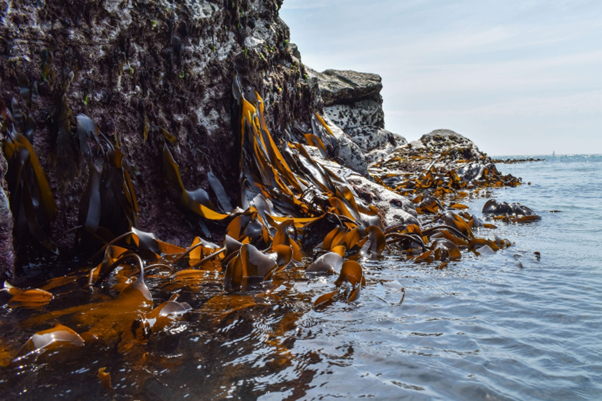“The carbon drawdown potential of this integrated approach is remarkable,” Netien said.
Sea, soil and oil have been brought together to produce a healthy, green and sustainable dietary supplement.
A collaboration between Cyprus-based olive oil company Oleaphen and UK-based seaweed packaging company Notpla has created 5ml single-dose olive oil packaged in edible seaweed, creating a breakthrough in the way the oil is produced and packaged.
The single-dose packaging resembles a pipette filled with olive oil that people can squeeze directly into their mouth, or blend directly into smoothies or teas. The pods can also be used to drizzle olive oil on top of salads or can be consumed all at once, packaging included.
The partnership combines Oleaphen’s systems of soil ecosystem restoration in olive oil production with Notpla’s environmentally friendly, seaweed-based packaging, benefitting terrestrial and marine environments while also enhancing human health.
“This represents a convergence of two regenerative systems,” Nicolas Netien, the founder of Oleaphen, told the Cyprus Mail.
Netien, a soil biologist, is considered an expert in the field of olive oil production and intends to accelerate the world’s transition towards sustainable systems. Notably, Netien’s “Kot-Kot project” uses the droppings of his flocks of free-range hens to fertilise his olive groves and enrich the soil without using manmade fertilisers.

According to Netien, Oleaphen’s agricultural approach rebuilds soil microbial communities, yielding olive oil with 30 times more polyphenols – a compound known to boost heart health and immunity – than regular olive oil.
Studies on olive oil polyphenols’ health benefits show that it strengthens cardiovascular health and provides protection from degenerative diseases, among other benefits.
The production of the new single-dose olive oil and its packaging offer many environmental benefits, according to Oleaphen and Notpla.
Environmental assessments show that the “regenerative agricultural system” established by Oleaphen removes 16kg of carbon dioxide from the atmosphere for every litre of oil produced.
“The carbon drawdown potential of this integrated approach is remarkable,” Netien said. “We’re demonstrating how thoughtfully designed agricultural systems can be part of the climate solution while producing exceptional food with therapeutic potential.”
Additionally, the edible, biodegradable packaging uses seaweed that requires no freshwater, land, or fertiliser, with its cultivation helping lower water acidity and enhance biodiversity.
“When harvested for beneficial uses like this packaging, [seaweed] creates a continuous improvement cycle for marine environments,” a representative from Notpla said. “We envision a future where innovative seaweed-based materials help eliminate single-use plastics entirely, creating a truly plastic-free world.”
Currently, plastic (PET) bottles and glass bottles are predominantly used to package olive oil. According to Netien, the seaweed-packaged olive oil boasts a carbon footprint 90 per cent less than that of oil sold in glass bottles.
Oleaphen’s olive oil is produced in Cyprus using “regenerative agricultural practices”, while the seaweed is harvested in the UK and is transformed into edible polymer there.
The seaweed-packaged olive oil doses are now available for pre-subscription, marking the first commercial application of this type of approach.
Contact: [email protected] or visit Highphenolic.com. Tel: +357 99227123






Click here to change your cookie preferences